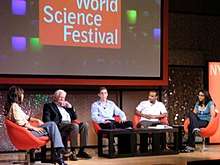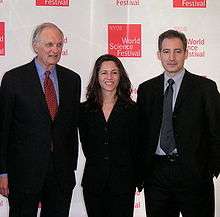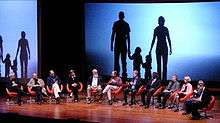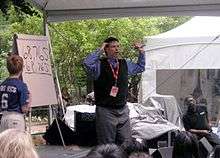World Science Festival, 2008
The 2008 World Science Festival was a science festival held in New York City. The festival (May 28 – June 1, 2008) consisted mainly of panel discussions and on-stage conversations, accompanied by multimedia presentations. A youth and family program presented topics such as sports from a scientific perspective and included an extensive street fair. A cultural program led by actor and writer Alan Alda focused on art inspired by science. The festival also included a World Science Summit, a meeting of high-level participants from the worlds of science, politics, administration, and business.
| World Science Festival, 2008 | |
|---|---|
 New York City high school students Michael Kaplan, Dennis Wynn, and Rachel Lachhmans, attend the panel interviewing Leon Lederman at the 2008 World Science Festival. | |
| Genre | Science festival |
| Location(s) | New York City, US |
| Attendance | … (2008) |
| Website | http://www.worldsciencefestival.com/ |
The festival was the brainchild of Columbia University physicist Brian Greene and his wife, Emmy Award-winning television journalist Tracy Day. It was held in partnership with major New York City cultural and academic institutions, including Columbia University, New York University and the Metropolitan Museum of Art.
History and background

The World Science Festival was founded by Brian Greene, a Columbia University physics professor and author of several popular-science books (such as The Elegant Universe), and his wife, Emmy Award-winning television journalist Tracy Day. Inspired by a visit to the 2005 Festival della Scienza in Genoa, where Greene had been invited to speak, the two decided that founding a similar festival in New York City would be a unique opportunity to bring science to the wider public. As they envisioned it, such a festival would allow them to combine Greene's skills as a scientist and science communicator with Day's as a journalist and producer: the events were meant to be rooted in science, but also to conform to the production standards of professional TV or theater productions.[1]
Day and Greene sounded out scientists and science communicators about their idea, enlisting many of their contacts as the festival's scientific advisors. They met with the presidents of the city's major universities and its cultural and scientific institutions, forging partnerships for the festival's organization. According to Greene, their idea fell on open ears wherever they went, and the most frequent reaction to their proposal was the expression of disbelief that a festival like this did not already exist in New York City.[1] Early 2006 saw the founding of the Science Festival Foundation (SFF), a non-profit organization based in New York City, dedicated to organizing the festival and related events. Greene serves as the foundation's chairman, and is also on its board of directors. The other members of the board are Alan Alda, Columbia University president Lee Bollinger, the foundation's president Judith Cox, New York University president John Sexton, and Tracy Day, who also serves as the festival's executive director.[2]
Next came the assembly of a team of producers who were to organize the festival's events. Notably Kyle Gibson, an Emmy Award-winning former producer of Nightline with Ted Koppel, joined the festival as senior program producer, while production of the Youth and Family Program was put into the hands of Robin Reardon, a former show producer for Walt Disney Imagineering and former vice president of Universal Studios Creative, who also became the festival's managing director.[3]
The foundation organizes the World Science Festival (WSF) in partnership with Columbia University, New York University, the City University of New York, Rockefeller University and the Cooper Union, as well as cultural institutions such as the Metropolitan Museum of Art, the Guggenheim Museum, and the Museum of Modern Art. Financial support comes from individuals, from numerous foundations, and from corporate sponsors which, for the 2008 festival, included the Sloan Foundation, the Simons Foundation, the Templeton Foundation, the Rockefeller Foundation, the Cullman Foundation, and Credit Suisse.[4]
Inaugural festival
The inaugural World Science Festival took place from May 28 to June 1, 2008, at 22 venues throughout New York City. It included 46 events, a street fair and, on its first day, the one-day World Science Summit at Columbia University. The Festival was attended by 120,000 people.[5] It featured several different kinds of presentations: science events for a general audience, a cultural program focusing on art inspired by science, and a youth and family program.[6] Although inaugural, no other festival is planned.
World Science Summit
Preceding the public events was the invitation-only World Science Summit on May 28, 2008; New York City Mayor Michael Bloomberg opened the Festival. At the summit, an invited audience interacted with eminent scientists in several panel discussions. Participants included Nina Fedoroff (Science and Technology Advisor to U. S. Secretary of State, Condoleezza Rice), biologist David Baltimore and cancer researcher Harold Varmus.[7]
As part of the summit, the winners of the first Kavli Prizes were announced in a simulcast linking New York City and Oslo. The first Kavli Prize for astrophysics was awarded to Maarten Schmidt and Donald Lynden-Bell for their pioneering work on quasars. Louis E. Brus and Sumio Iijima shared the nanoscience prize for their contributions to the science of quantum dots and carbon nanotubes, respectively. Pasko Rakic, Thomas Jessell and Sten Grillner were awarded the neuroscience prize for their research into how neuronal networks develop and communicate.[8]
Festival events

Events covered a wide variety of scientific topics, and combined talks, demonstrations, video presentations and panel discussions. A number of events addressed "big questions". For example, a roster of scientists including physicist William Phillips, philosopher Patricia Churchland, neuroscientist Antonio Damasio, philosopher Daniel Dennett, cognitive scientist Marvin Minsky, and cancer researcher Harold Varmus, debated "What It Means to Be Human" in a panel discussion moderated by Charlie Rose. A recurring theme was the wider implications of scientific results, as exemplified by a discussion on the promises and consequences of personal genomics involving biochemist Paul Nurse, sociologist Nikolas Rose, and human genome project leader Francis Collins. A number of events explored the interface between science and the arts; for instance, a panel including psychologist Nancy C. Andreasen, choreographer and dancer Bill T. Jones, and actor and writer Michael York focused on the scientific study of creativity. Other audiences saw physicists Lawrence Krauss and radio host Ira Flatow presenting modern cosmology, paleontologist Richard Leakey exploring the sixth extinction, and chemist F. Sherwood Rowland and Rensselaer Polytechnic president Shirley Ann Jackson discussing new ways of satisfying humanity's energy needs. A number of events were co-productions with the festival's partners, such as a discussion between Robert Krulwich and neurologist and author Oliver Sacks on perception, held at the Metropolitan Museum of Art, and musician Mark Oliver Everett's exploration of the scientific legacy of his father, Hugh Everett, at the Museum of Modern Art.[9]
The festival's cultural program ranged from a string theory-themed dance performance choreographed by Karole Armitage to a storytelling event in cooperation with The Moth, which featured journalist and writer Lucy Hawking, physicist Jim Gates and writer Sam Shepard, among others. Alan Alda revisited his role as Richard Feynman in Peter Parnell's play QED in a staged reading at Columbia University's Miller Theatre, and the choir of the Abyssinian Baptist Church joined Oliver Sacks in an exploration of music and science. The festival also saw the première of Dear Albert, a reading for the stage written by Alda based on the letters of Albert Einstein, and starring Anthony LaPaglia as Einstein.[10]
Events for a younger audience included an examination of the science of sports (with sports scientist Tom Crawford, neuroscientist David Eagleman, and athletes such as Brevin Knight, Lisa Willis and Leilani Mitchell). For the festival's first event, New York City high-school students interviewed robotics expert Cynthia Breazeal and physicist Leon Lederman on-stage, moderated by MTV's SuChin Pak. Another event was presented by the Disney Imagineers, who explored the science of special effects and amusement park technology, from roller coasters and fireworks to motion capture and artificial fog.[11]
Street Fair

The WSF Street Fair took place in and around Washington Square Park, on the New York University campus, on Saturday, May 30, 2008. Although it was interrupted by a thunderstorm, the street fair was attended by 100,000 people, according to estimates from the New York Police Department.[12]
Stage events at the street fair included live performances by the "Mathemagician" Arthur T. Benjamin, "science rapper" Zach Powers of PCR RAP fame,[13] and a band called "The Mathematicians", science demonstrations by teams from institutions such as the Liberty Science Center and the Franklin Institute, and presentations by journalist and author Lucy Hawking and visual artist Scott Draves, among others. The street fair featured appearances by Disney's animatronic dinosaur Lucky, by characters from science- and education-related TV shows such as Cyberchase, It's a Big Big World, Clifford the Big Red Dog and Zula Patrol, as well as demonstrations by teams participating in the New York–New Jersey FIRST Robotics Competition, and hands-on activities such as owl pellet dissections and miniature rocket launches. Also present were a movable museum from the American Museum of Natural History and the Magic School Bus.[14]
Reception
Festival coverage leading up to the 2008 festival, which included articles in major newspapers and appearances by Alda and Greene on national shows such as Regis and Kelly and The Colbert Report, mostly focused on introducing the festival's concept, organizers and events, and on the promise of bringing an event of this type to New York.[15] Aside from mention of small organizational glitches, coverage of festival events was generally positive. Both Good Morning America and Science News focused on the potential of the festival to inspire the next generation of scientists and "make geek chic".[16] The New York Post described the festival's role in New York's cultural landscape as the geek counterpart of Fashion Week and the Tony Awards,[17] while the Science Channel's coverage characterized the festival as "wonderfully inspiring and informative".[18] The New York Times noted that Greene and Day appeared to have succeeded in creating "a new cultural institution";[19] further Times articles declared the festival a critical and a box office success.[20]
Online coverage typically focused on specific festival events. Notably, Science, Wired, The Science Channel and USA Today provided same-day or next-day accounts of events including "What It Means to Be Human", "Ramachandran/Kurzweil: Humanity Now/Humanity Next", "Future Cities", as well as the two events featuring Oliver Sacks.[21]
References
- Cf. Musser, George (April 25, 2008), "A Science Fête Project: A Q&A with Brian Greene", Scientific American, archived from the original on November 18, 2008, retrieved 2008-11-24
- Non-profit status and chairman position from the foundation's 990-EZ form for 2006, accessible online via GuideStar, GuideStar USA, Inc., 2008, archived from the original on 2020-01-15, retrieved 2008-06-11. Current board of directors from World Science Festival (April 2008), Board of directors, Science Festival Foundation, archived from the original on June 7, 2008, retrieved 2008-06-08.
- World Science Festival Website: Founders and Staff, Science Festival Foundation, 2008, archived from the original on June 5, 2008, retrieved 2008-06-25. Biographical information for Kyle Gibson: World Science Festival Website: Kyle Gibson, Science Festival Foundation, 2008, archived from the original on June 2, 2008, retrieved 2008-06-25 and biographical note in Koppel, Ted; Gibson, Kyle (1996), History in the Making and the Making of Television, Times Books, ISBN 978-0-8129-2478-7. Biographical information for Robin Reardon: World Science Festival Website: Robin Reardon, archived from the original on June 2, 2008, retrieved 2008-06-25 and R3Productions Website: Robin Reardon, R3Productions, LLC, archived from the original on 2009-05-31, retrieved 2008-06-25
- As listed in Overbye, Dennis (April 3, 2008), "Coming to New York, a Science Event for the Masses", New York Times, pp. E2, archived from the original on April 30, 2011, retrieved 2008-04-30
- Venues and event numbers: Overbye, Dennis (June 3, 2008b), "An Overflowing Five-Day Banquet of Science and Its Meanings", New York Times, archived from the original on April 30, 2011, retrieved 2008-06-05. Summit: Timmer, John (May 28, 2008b), "First Kavli Prize winners in new fields of science announced", Ars Technica, archived from the original on May 29, 2008, retrieved 2008-06-05. Attendance: Souccar, Miriam (June 6, 2008), "City's Science Festival attracts record numbers", Crain's New York Business, archived from the original on November 17, 2008, retrieved 2008-06-06
- Timmer, John (April 3, 2008), "NYC to host the World Science Festival in May", Ars Technica, archived from the original on May 7, 2008, retrieved 2008-04-28
- Richburg, Keith B. (May 29, 2008), "U.S. Experts Bemoan Nation's Loss of Stature in the World of Science", Washington Post, pp. A04
- Timmer, John (May 28, 2008b), "First Kavli Prize winners in new fields of science announced", Ars Technica, archived from the original on May 29, 2008, retrieved 2008-06-05
- General description: Overbye, Dennis (June 3, 2008b), "An Overflowing Five-Day Banquet of Science and Its Meanings", New York Times, archived from the original on April 30, 2011, retrieved 2008-06-05. Additional participant names as listed on the Festival's website at World Science Festival (2008), Speakers, Science Festival Foundation, archived from the original on July 1, 2008, retrieved 2008-07-17; additional event information from the entries in World Science Festival, All Events by Date, Science Festival Foundation, archived from the original on July 16, 2008, retrieved 2008-07-17.
- Armitage, Sacks, Moth: Overbye, Dennis (June 3, 2008b), "An Overflowing Five-Day Banquet of Science and Its Meanings", New York Times, archived from the original on April 30, 2011, retrieved 2008-06-05. Additional information on Moth event: Tierney, John (May 30, 2008), "Early Reviews of Science Festival", TierneyLab, The New York Times, archived from the original on June 4, 2008, retrieved 2008-06-25. Dear Albert: van Gelder, Lawrence (May 12, 2008), "Arts, Briefly: Footnotes", New York Times, archived from the original on April 30, 2011, retrieved 2008-06-25 and Hoffman, Jascha (2008), "Insight into Einstein", Nature, 453 (7198): 987, Bibcode:2008Natur.453..987H, doi:10.1038/453987a
- Sports: Scalera, Nicholas (June 1, 2008), "Science of Sports", Science Channel's Live Coverage of World Science Festival 2008, archived from the original (– Scholar search) on June 1, 2008, retrieved 2008-06-25. Lederman/Breazeal interviews: Zielinski, Jess (May 30, 2008), "World Science Festival: Pioneers in science", USA Today Blogs: Science Fair, USA Today. Disney Imagineering event: Cohen, Patricia (May 31, 2008), "The World Science Festival: Behind Disney's Magic", ArtsBeat, The New York Times, archived from the original on June 5, 2008, retrieved 2008-06-25. Participant information coincides with that given on the festival's website at World Science Festival, Speakers, Science Festival Foundation, archived from the original on August 3, 2008, retrieved 2008-07-17
- Participant number: Timmer, John (June 19, 2008), "World Science Festival wrapup", Ars Technica, archived from the original on June 20, 2008, retrieved 2008-06-25. Inclement weather: Tierney, John (June 1, 2008), "Happy Fairgoers, Worried Biologists", TierneyLab, The New York Times, archived from the original on September 30, 2019, retrieved 2008-06-25
- Powers, Zach (Aug 17, 2009), The PCR Rap, YouTube, archived from the original on April 30, 2012, retrieved 2009-08-17
- Graeber, Laurel (May 30, 2008), "Spare Times: For Children - World Science Festival", New York Times, archived from the original on December 20, 2016, retrieved 2008-06-06 and Tierney, John (June 1, 2008), "Happy Fairgoers, Worried Biologists", TierneyLab, The New York Times, archived from the original on September 30, 2019, retrieved June 25, 2008, with additional information from World Science Festival (April 2008), WSF Street Fair, Science Festival Foundation, archived from the original on July 31, 2008, retrieved 2008-10-06.
- E.g. Timmer, John (April 2, 2008), "NYC to host the World Science Festival in May", Ars Technica, archived from the original on April 7, 2008, retrieved 2008-04-18 and Overbye, Dennis (April 3, 2008), "Coming to New York, a Science Event for the Masses", New York Times, pp. E2, archived from the original on April 30, 2011, retrieved 2008-04-18. Colbert report video online at The Colbert Report for May 27, 2008: Brian Greene, Comedy Central, 2008, retrieved 2008-10-21; Regis and Kelly: Alda guest appearance on May 23, 2008 listed and described on Guest Guide Archive (Official "Live with Regis and Kelly" Website), Disney/ABC Domestic Television, archived from the original on 2008-10-29, retrieved 2008-11-25 (Entry under "Week of May 19–23, 2008)
- "Science Rocks!", ABC News, June 1, 2008, archived from the original on June 7, 2008, retrieved 2008-11-25 (including quotation), "Alan Alda Starts Science Festival", ABC News, June 1, 2008, archived from the original on June 1, 2009, retrieved 2008-11-25, and Raloff, Janet (May 30, 2008), "Son of Furby", Science News Online, archived from the original on December 1, 2008, retrieved 2008-11-25
- Silverman, J. R. (May 30, 2008), "Science and the City", New York Post, archived from the original on May 31, 2009, retrieved 2008-11-25
- Scalera, Nicholas (June 1, 2008), "Human, All Too Human", Science Channel's Live Coverage of World Science Festival 2008, archived from the original (– Scholar search) on June 6, 2008, retrieved 2008-11-25
- Quotations from Overbye, Dennis (June 3, 2008b), "An Overflowing Five-Day Banquet of Science and Its Meanings", New York Times, archived from the original on April 30, 2011, retrieved 2008-06-05; a similar assessment in Timmer, John (June 19, 2008), "World Science Festival wrapup", Ars Technica, archived from the original on June 20, 2008, retrieved 2008-06-25
- Box office: Tierney, John (May 30, 2008), "Boffo Box Office for Science Festival", TierneyLab Blog, The New York Times, archived from the original on August 20, 2008, retrieved 2008-10-22; critics: Tierney, John (May 30, 2008), "Early Reviews of Science Festival", TierneyLab Blog, The New York Times, archived from the original on August 20, 2008, retrieved 2008-10-22.
- Bhattacharjee, Yudhijit (May 31, 2008), "A sociologist among geneticists", Findings: Science Magazine News Blog, archived from the original on January 5, 2009, retrieved 2008-11-25
• Shulman, Polly (June 1, 2008), "The Meaning of Life", Findings: Science Magazine News Blog, archived from the original on January 5, 2009, retrieved 2008-11-25
• Shulman, Polly (June 1, 2008), "Halting the Handbasket", Findings: Science Magazine News Blog, archived from the original on November 19, 2008, retrieved 2008-11-25
• Bhattacharjee, Yudhijit (June 1, 2008), "To meet a famous scientist", Findings: Science Magazine News Blog, archived from the original on January 6, 2009, retrieved 2008-11-25
• Bhattacharjee, Yudhijit (June 1, 2008), "Where's the evidence? (Or What is evidence?)", Findings: Science Magazine News Blog, archived from the original on January 6, 2009, retrieved 2008-11-25
• Keim, Brandon (June 1, 2008), "What Does It Mean to Be Human?", Wired Science, archived from the original on December 14, 2008, retrieved 2008-11-25
• Keim, Brandon (May 30, 2008), "Poetry Comes from Our Tree-Climbing Ancestors, Neuroscientist Says", Wired Science, archived from the original on December 31, 2008, retrieved 2008-11-25
• Keim, Brandon (May 31, 2008), "The Persistence of Vision: A Story of Freakish Perception", Wired Science, archived from the original on December 17, 2008, retrieved 2008-11-25
• Keim, Brandon (May 31, 2008), "Five People Who'll Make You Feel Good About the Future", Wired Science, archived from the original on December 10, 2008, retrieved 2008-11-25
• Keim, Brandon (June 2, 2008), "Pharmaceutical Fountain of Youth Could Cost Pennies", Wired Science, archived from the original on December 17, 2008, retrieved 2008-11-25
• Zielinski, Jess (June 2, 2008), "World Science Festival: 'The Laws for Life'", USA Today Science Fair, retrieved 2008-11-25
• Zielinski, Jess (June 2, 2008), "World Science Festival: '90 is the New 50'", USA Today Science Fair, retrieved 2008-11-25
• Zielinski, Jess (May 31, 2008), "World Science Festival: 'Brain Tricks'", USA Today Science Fair, retrieved 2008-11-25
• Zielinski, Jess (May 31, 2008), "World Science Festival: 'The Science of Sports'", USA Today Science Fair, retrieved 2008-11-25
• Zielinski, Jess (June 1, 2008), "World Science Festival: 'Music and the Brain'", USA Today Science Fair, retrieved 2008-11-25
• Scalera, Nicholas (June 1, 2008), "Human, All Too Human", Science Channel's Live Coverage of World Science Festival 2008, archived from the original (– Scholar search) on 2008-06-06, retrieved 2008-11-25
• Quinlan, Heather (May 31, 2008), "About Your Genes", Science Channel's Live Coverage of World Science Festival 2008, archived from the original (– Scholar search) on June 1, 2008, retrieved 2008-11-25
• Scalera, Nicholas (June 1, 2008), "Science of Sports", Science Channel's Live Coverage of World Science Festival 2008, archived from the original (– Scholar search) on June 1, 2008, retrieved 2008-11-25
• Quinlan, Heather (May 31, 2008), "Invisible Reality", Science Channel's Live Coverage of World Science Festival 2008, archived from the original (– Scholar search) on June 1, 2008, retrieved 2008-11-25
• Scalera, Nicholas (May 31, 2008), "Not the Usual Doom and Gloom", Science Channel's Live Coverage of World Science Festival 2008, archived from the original (– Scholar search) on June 1, 2008, retrieved 2008-11-25
• Quinlan, Heather (May 31, 2008), "To See or Not to See", Science Channel's Live Coverage of World Science Festival 2008, archived from the original (– Scholar search) on June 1, 2008, retrieved 2008-11-25
• Scalera, Nicholas (May 31, 2008), "Help Wanted!", Science Channel's Live Coverage of World Science Festival 2008, archived from the original (– Scholar search) on June 1, 2008, retrieved 2008-11-25
• Quinlan, Heather (May 30, 2008), "Toil and Trouble", Science Channel's Live Coverage of World Science Festival 2008, archived from the original (– Scholar search) on June 1, 2008, retrieved 2008-11-25
• Quinlan, Heather (May 30, 2008), "Meet the Pioneers", Science Channel's Live Coverage of World Science Festival 2008, archived from the original (– Scholar search) on June 1, 2008, retrieved 2008-11-25
External links
| Wikimedia Commons has media related to 2008 World Science Festival. |